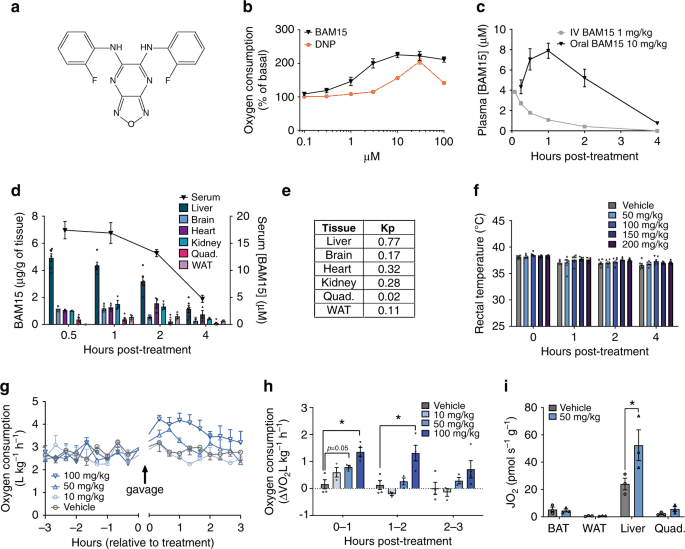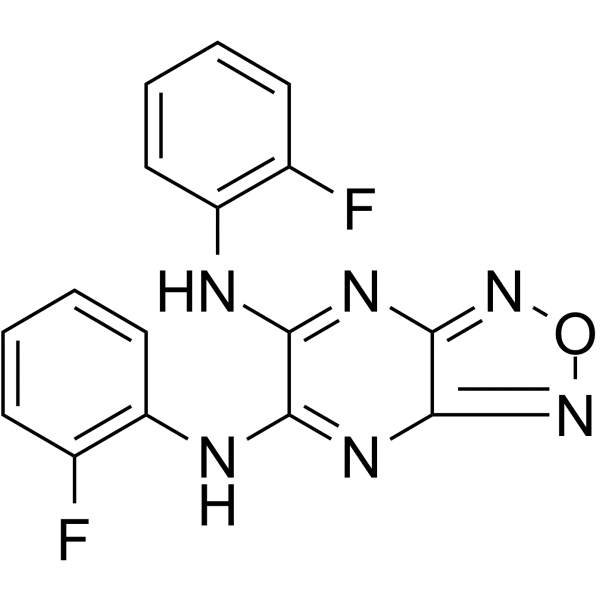Vinny
Member
Appreciate you response.It's a safe compound if used smartly. Most people who say it's dangerous are the ones who get impatient and abuse it.
Follow along with the video below to see how to install our site as a web app on your home screen.
Note: This feature may not be available in some browsers.
Click Here if you want to upgrade your account
If you were able to post but cannot do so now, send an email to admin at raypeatforum dot com and include your username and we will fix that right up for you.
Appreciate you response.It's a safe compound if used smartly. Most people who say it's dangerous are the ones who get impatient and abuse it.
Just for giggles & perhaps a lot more safety:Appreciate you response.

Cool stuff.Just for giggles & perhaps a lot more safety:

Mitochondrial uncoupler BAM15 reverses diet-induced obesity and insulin resistance in mice - Nature Communications
Obesity is a global pandemic with limited treatment options. Here, the authors show evidence in mice that the mitochondrial uncoupler BAM15 effectively induces fat loss without affecting food intake or compromising lean body mass.www.nature.com
Just curious, what is your salt (sodium) intake daily ?Thank you, sir.
I eat a lot of very ripe fruit and sugar all day, every day.
I usually do fruit mono-meals covered with organic sugar.
Throughout the morning and early afternoon today I ate the following:
2 pounds of frozen mango chunks
32 oz of Greek Non-fat yogurt covered in organic brown sugar
I put about half the 1 pound bag of sugar on the fruit and the other half on the yogurt.
540 Calories of mangos (126g carbs, 0g fat, 6g protein)
550 Calories of Greek Yogurt (35g carbs, 0g fat, 108g protein)
1710 Calories of Organic Sugar (456g carbs, 0g fat, 0g protein)
That keeps me powered up all day.
I also usually sip a large 16oz Red Bull throughout the day which is 210 calories.
After my workout, I have 80g of very well-cooked sticky Sushi rice, 4 oz of sauteed chicken breast with a little chicken livers in a tbsp of coconut oil and an orange marmalade sauce.
I do not know the calorie breakdown for that meal, but we could work together and figure it out.
See attached pictures of the fruit, sugar, and yogurt I eat.
So the fruit, sugar, yogurt and Red Bull I consume throughout the day is about 3,000 calories.
Then add the post-workout chicken and rice meal and I am probably consuming close to 3,800 calories on workout days.
that's a great questionJust curious, what is your salt (sodium) intake daily ?
But do you add table salt to your foods at all ?that's a great question
I'm not sure, to be honest
I've never calculated that
the only meal that I add salt to taste is the last one with the very well cooked white riceBut do you add table salt to your foods at all ?
wow... that's a lot of salt in one dish.the only meal that I add salt to taste is the last one with the very well cooked white rice
just from the fruit and sugar and yogurt meals I am getting about 500mg sodium
I add about 3-4 tsp of sea salt to my last meal which is approximately 3500-5000 mg of sodium
So I am estimating 4000-5500 mg Sodium per day
If someone took DNP, do you think it would be wise to take cardiolipin?More ATP is not always good. Cancer cells produce a ton of ATP, through through glycolysis instead of OXPHOS. ATP also has a negative feedback cycle with pyruvate dehydrogenase, so maximizing ATP production is not desirable. The best health outcomes are seen in moderately uncoupled states and, as you know, that is what DNP does and this is why it is being proposed for treatment of diabetes, CVD, and even cancer.
Have you tried it before? If I use 125 mgs a day, would it be dangerous to lift weights or do I put myself at risk of overheating?It's a safe compound if used smartly. Most people who say it's dangerous are the ones who get impatient and abuse it.
I have not tried it personally and I'm not at a BF % where I think I would either. It's best to be really conservative, like 125-200mg, as it depends on your temps. If you're 36 and use 200mg to get to 37.4, then weight training can still be done. If you're getting closer to 39-40, then it's likely getting quite dangerous. But weight training doesn't induce that much heat if reps are kept low and rest long.Have you tried it before? If I use 125 mgs a day, would it be dangerous to lift weights or do I put myself at risk of overheating?
Thanks brother. Makes senseI have not tried it personally and I'm not at a BF % where I think I would either. It's best to be really conservative, like 125-200mg, as it depends on your temps. If you're 36 and use 200mg to get to 37.4, then weight training can still be done. If you're getting closer to 39-40, then it's likely getting quite dangerous. But weight training doesn't induce that much heat if reps are kept low and rest long.
Watching a Friend go From 230 to 185 and now does diet/low carb/excersise 2x a day. Then three days later eats like 4k calories of fried chicken/mac and cheese and drinks like 4 sugary maragaritias and repeats.This is by far the most significant study I have seen come out in the last 2-3 years, simply because of the impact it has on virtually every person out there who has tried to lose excess weight (and who hasn't?). Virtually every person considering (or having done) dieting/exercise to lose excess weight dreads the infamous "rebound". You see, losing weight is not that hard for most people, even the weak-willed couch potatoes. It is keeping it off after losing it that is the hard part. Years ago, I posted about a study on the contestants in the show the Biggest Loser.
"Biggest Loser" Contestants Regained Weight. Peat Perspective
As I explained in that post, not only had all of them regained the lost weight within 6 months after leaving the show, but many of them found out they surpassed their original weight even on a lower-calorie diets. How could this be!?? Well, the study on the Biggest Loser found out that the resting metabolic rate of the contestants had plummeted as a result of the drastic weight loss they had endured, so when they stopped the grueling regimen those poor souls had the metabolic rate of turtles (famously slow metabolizers). Worse, in the process of losing that excess weight, the contestants lost a majority of their lean muscle mass and by the time they were done with the show they all had some degree of the so-called "sarcopenic obesity" (colloquially known as "skinny-fat"), which even doctors dread as they know this condition is a very good predictor of future mortality and morbidity and puts people with that condition at a higher risk than even the morbidly obese people that those "losers" used to be. Lean muscle mass is one of the primary determining factors of the resting metabolic rate (RMR) and losing it through severe dieting and/or exhaustive exercise is one of the worst outcomes one can "achieve" with such regimens.
Now, the study below demonstrates that the dastardly PUFA plays a central role in this fiasco. The study confirmed again that weight loss reduced RMR, and found that the mechanism behind this reduction in RMR is the increased proportion of PUFA-containing phospholipids in cardiolipin (the crucial mitochondrial enzyme, largely controlling the speed of OXPHOS). Specifically, the study found that weight loss through dieting/exercise increased the content of the omega-6 linoleic acid phospholipid species composing cardiolipin. Dr. Peat mentioned in several of his interviews that the lipid composition of cardiolipin changes over the lifespan of a human (and most mammals), being composed of mostly saturated fats in childhood and progressively switching to PUFA species in adulthood and old age (the same process is seen in most chronic diseases too). Conversely, several studies have shown that feeding old animals lipids completely devoid of PUFA can change the cardiolipin composition back to a more PUFA-deficient state and restore the metabolic rate of even very old animals back to youthful levels. The human equivalent dose (HED) of that PUFA-deficient lipid feeding study was ~200mg/kg, so for most humans a daily dose of 15g-20g of coconut or moringa oils (both have very low PUFA content), or a completely hydrogenated oil (as the study used, but more difficult to obtain) may be able to prevent/reverse the decline in metabolic rate seen after dieting/exercising people and/or even old age.
Weight loss increases skeletal muscle mitochondrial energy efficiency in obese mice
Enhancing Muscle Mitochondrial Efficiency After Weight Loss
Increasing skeletal muscle mitochondrial efficiency after weight loss as a novel mechanism for lower energy expenditure
Weight regain is a common problem for weight loss individuals. A number of studies have shown that weight loss in overweight people results in a reduction in whole-body energy expenditure.medicalxpress.com
"...Regaining weight is a prevalent issue among individuals who have lost weight. Several research studies indicate that overweight individuals experience a decrease in overall energy expenditure after shedding pounds. This decline in energy expenditure disproportionately affects different tissues, resulting in an energetic mismatch. This imbalance is primarily due to a reduction in lean tissue, thereby increasing the likelihood of regaining weight. Despite identifying this phenomenon, the precise mechanisms of how weight loss affects skeletal muscle mitochondrial respiration remain unknown, and concrete evidence is yet to be established. In April 2023, Life Metabolism featured a study by Professor Katsuhiko Funai at the University of Utah titled "Weight loss elevates skeletal muscle mitochondrial energy efficiency in obese mice." The research team discovered that obese mice undergoing weight loss experienced an improvement in the efficiency of skeletal muscle mitochondrial oxidative phosphorylation, leading to decreased energy expenditure throughout the body. This reduction in energy expenditure may contribute to weight regain following weight loss."
"...To investigate the effects of weight loss on mitochondrial energy metabolism, researchers conducted a study using obese mice treated with dietary interventions to induce weight loss. High-resolution respirometry and fluorometry measurements were used to assess changes in mitochondrial energy metabolism, while mitochondrial proteomes and lipidomes were analyzed to examine any related changes. The results showed that while there was no significant change in mitochondrial proteomes or respiratory chain supercomplex formation, weight loss did lead to an increase in oxidative phosphorylation efficiency (as seen in Figure 1). Additionally, the researchers found that weight loss accelerated the remodeling of mitochondrial cardiolipin (CL) acyl-chains, resulting in an increase in the content of tetralinoleoyl CL (TLCL), a lipid species believed to be critical for respiratory enzymes. Knocking down the CL acyltransferase tafazzin was shown to reduce TLCL levels and skeletal muscle oxidative phosphorylation levels, allowing mice to avoid diet-induced weight gain (also shown in Figure 1). Taken together, these findings suggest that weight loss can increase skeletal muscle mitochondrial energy production efficiency, leading to a reduction in overall energy expenditure in the body."
Look further up the thread to my post on BAM15. Seems completely safe and just as effective as DNP.I have not tried it personally and I'm not at a BF % where I think I would either. It's best to be really conservative, like 125-200mg, as it depends on your temps. If you're 36 and use 200mg to get to 37.4, then weight training can still be done. If you're getting closer to 39-40, then it's likely getting quite dangerous. But weight training doesn't induce that much heat if reps are kept low and rest long.
Yes I've seen it. Do you know where to source it for roughly the same price as DNP? People won't buy something that's very expensive if they have a cheaper equally effective option.Look further up the thread to my post on BAM15. Seems completely safe and just as effective as DNP.
With just a cursory glance this is the best price out of a handfull of labs. I have no idea what DNP costs.Yes I've seen it. Do you know where to source it for roughly the same price as DNP? People won't buy something that's very expensive if they have a cheaper equally effective option.
